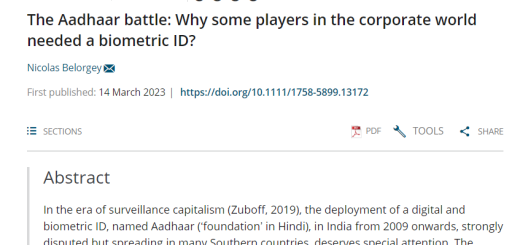Telle O., Nikolay B., Kumar V., Benkimoun S., Pal R., Nagpal B., Paul Richard E., (2021). « Social and environmental risk factors for dengue in Delhi city: A retrospective study », PloS Neglected Tropical Diseases, 15(2) .

Oliver Telle, former head researcher of the Urban Dynamics department of CSH has co-authored (along with CSH members Rupali Pal and Samuel Benkimoun) an article on dengue in Delhi published in PLOS Neglected Tropical Diseases, also headlining the release. It is a retrospective study of risk factors for dengue in Delhi’s urban environment.
This article can be found here: https://journals.plos.org/plosntds/article?id=10.1371/journal.pntd.0009024
Author summary: Identifying disease hotspots and individual risk factors for dengue can enable targeted intervention strategies. We conducted combined serological, entomological and socio-economic surveys across 18 areas within Delhi, taken from the total 1280 colonies (i.e. the administrative units of reference in Delhi) for which we classified their socio-economic typology. We additionally performed a Knowledge, Attitudes, Practices survey at a household level within the most socially disadvantaged sub-districts. Finally, we mapped all the winter dengue cases to 250 m x 250 m units along with their winter mean temperatures. We found that access to tap water was an important risk factor for exposure to dengue virus (DENV) and this was confirmed even within the socially disadvantaged sub-districts. The Wealthy colonies had a high burden of DENV infection despite low mosquito densities, likely linked to their connectedness through daily human mobility. The winter burden of dengue occurred majoritarily in the socio-economically disadvantaged colonies, which also have higher mean temperatures and urban heat islands. Improved access to tap water could lead to a reduction in dengue, not only for those directly affected but for the general population. Targeted intervention through mosquito control in winter in the socially disadvantaged areas could offer a rational strategy for optimising control efforts.








